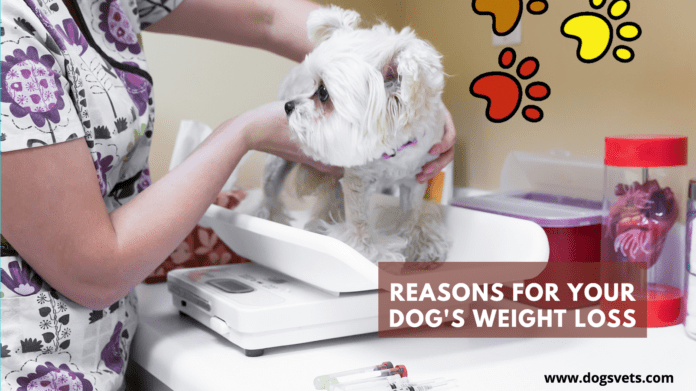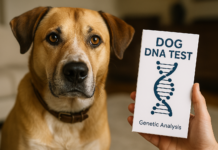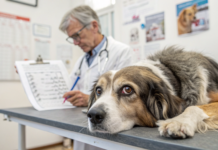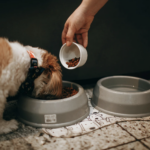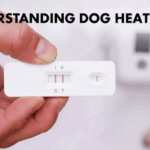Last Updated on April 27, 2022 by Dogs Vets
Possible Reasons for Your Dog’s Weight Loss
Weight loss in dogs can be caused by a wide range of medical conditions and problems. Here are five possible explanations for why your pet may be skipping meals or putting on weight.
1. Concerns Regarding Food
Are there any recent dietary changes you’ve made for your dog, or has their standard dog food been reformulated?
It is possible that some dogs are picky eaters who do not adapt well to dietary changes.
It doesn’t matter if the dog food manufacturer only tweaked a couple of ingredients in their recipe, a picky dog will likely notice and turn their nose up at the strange new tastes and smells.
When dogs are exposed to stressful situations, they may develop a food aversion.
In some cases, such as when you bring a new pet into the house or when you have an aggressive dog that eats in the same vicinity as a submissive dog, the submissive dog may become too afraid or anxious to eat at mealtimes.
If you’ve recently relocated, you may notice that the tap water tastes different from the tap water at your previous residence.
In the event that you use water to moisten your dog’s kibble in order to keep them from getting bored, the changed flavor of the water may be discouraging your dog from eating.
2. Diabetes Mellitus
Diabetes mellitus is one of the diseases dogs have that can cause rapid weight loss in dogs, according to the American Veterinary Medical Association. Dogs who lose weight as a result of diabetes frequently exhibit other symptoms in addition to food aversion and deteriorating conditions.
Diabetes in dogs can manifest itself in a variety of ways, including the following symptoms in addition to unexplained weight loss:
- Excessive water consumption
- Cataract formation
- Frequent urination
- Increased hunger
Canine diabetes mellitus, like human diabetes mellitus, is a disease in which a dog does not produce enough insulin to break down blood sugar for sustenance.
Without enough insulin levels, a dog’s system begins breaking down proteins and lipids for energy, eventually resulting in a significant physical decrease in the pet.
If your veterinarian suspects your dog has diabetes mellitus, he or she will do blood glucose and urinalysis testing. Diabetes mellitus in dogs is typically treated with insulin injections and a particular diet.
3. Pain-related Issues
Physical discomforts can lead your dog to stop eating. For instance, an abscessed or damaged tooth can impair your dog’s ability to chew.
If your dog has ulcers on their tongue or sores within their mouth, chewing dry kibble may be painful, causing the dog to avoid food.
A component of your dog’s food could be causing unpleasant stomach problems. Bloating, cramping, and gas may make your dog feel uneasy following a meal, causing the dog to lose interest in their favorite meals.
If your dog recently ate trash, he or she may have acquired a blockage in the intestines, preventing food from passing through the digestive tract normally.
Keep an eye out for the following indicators to assess whether your dog is avoiding food due to a major obstruction or another uncomfortable bodily problem:
- Abdominal pain
- Vomiting
- Drooling or panting
- Anxiety or lethargy
- Dog scream in pain when the stomach is touched
- Strange breathing sounds
If any of the aforementioned symptoms are present, bring your dog in for a checkup. In dogs, a tumor, foreign item, or simple allergic reaction can produce extreme pain that causes them to stop eating or lose weight.
4. Cancer
Significant weight loss and appetite loss may be signs that your dog is suffering from cancer. Because cancer alters the way the body utilizes nutrients, weight loss is frequently one of the first symptoms observed in sick dogs.
Additional indicators of cancer in dogs include the following:
- Bad odors from dog
- Eating problems
- Exhaustion
- New cysts or swollen spots
- Limping and other mobility issues
- Urination and defecation changes
- Coughing or shortness of breath
- Skin sores that don’t heal
- Excessive drool
Cancer-stricken dogs may also demonstrate personality changes. Make an appointment for your dog to be examined if you fear he or she has cancer.
Your dog’s veterinarian can run diagnostic tests to confirm or rule out the presence of cancer in your pet and can advise you on the many treatment options available.
5. Additional Weight-Related Diseases and Issues
In dogs, kidney dysfunction can result in weight loss and deterioration of condition. A simple blood test can detect whether or not your dog has kidney disease.
In dogs, high parasite loads might result in weight loss. Your veterinarian will screen for worms and other parasites in your dog if this is considered to be the cause of your dog’s weight problems.
Once the parasites have been removed from the dog’s system, the weight of the dog should improve.
Weight loss in dogs can also be caused by surgery, pharmacological responses, stress, heart disease, and other factors.
If your dog is refusing to eat, losing weight, or has any other digestive or feeding problems, it is prudent to consult a veterinarian. The likelihood is that your dog’s weight loss can be handled with the assistance of your veterinarian and a few tweaks to your dog’s routines.
Questions People Are Asking
What should I do if my dog is losing weight?
What to do if your dog’s weight suddenly drops. Due to the fact that rapid weight loss is a common symptom of several complex, chronic diseases, such as renal failure or diabetes, it is critical that you schedule an appointment with a veterinarian if you discover your dog has lost weight suddenly.
Why is my dog becoming underweight and refusing to eat?
Bear in mind that weight loss can be an indication of a variety of conditions, including diabetes, cardiovascular disease, liver or kidney disease, and cancer.
Additionally, it can be an indication of poor digestion, dental illness, or difficulty swallowing. Weight loss in older dogs is not normal; thus, if your senior dog is losing weight, visit your veterinarian immediately.
Facts Check
We hope you enjoyed this article… What are your thoughts?
Рleаse feel free to share with us in the comments section below!
